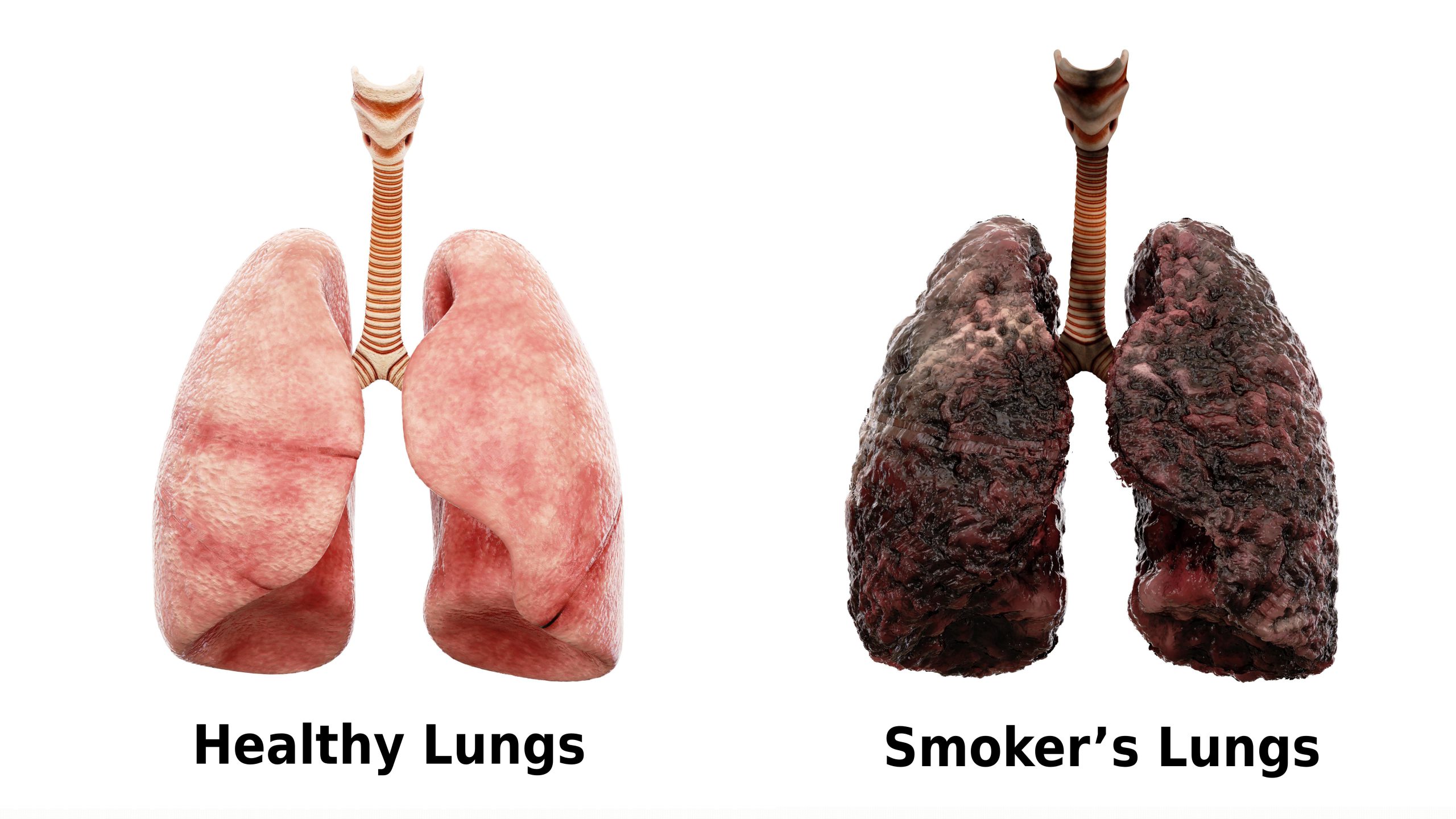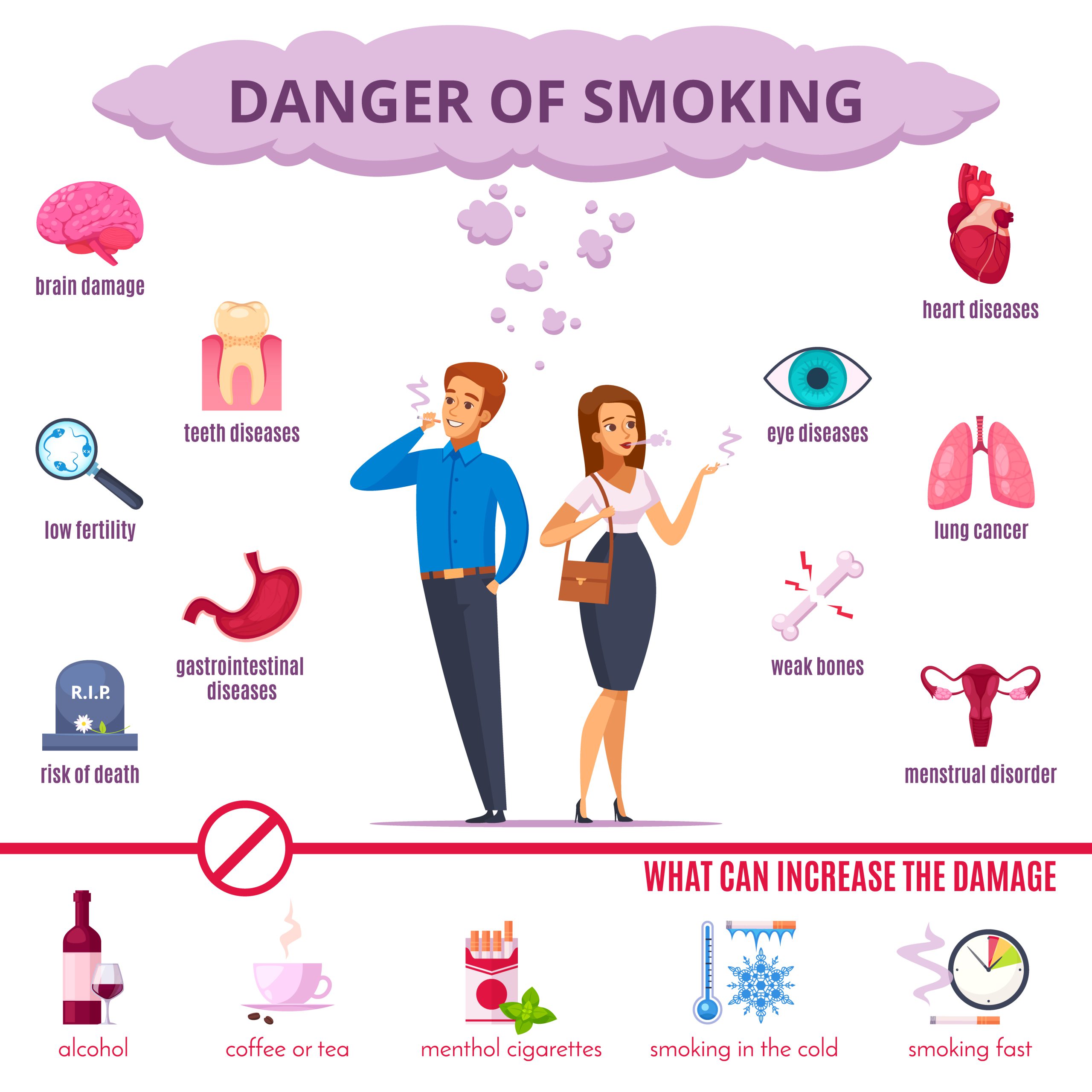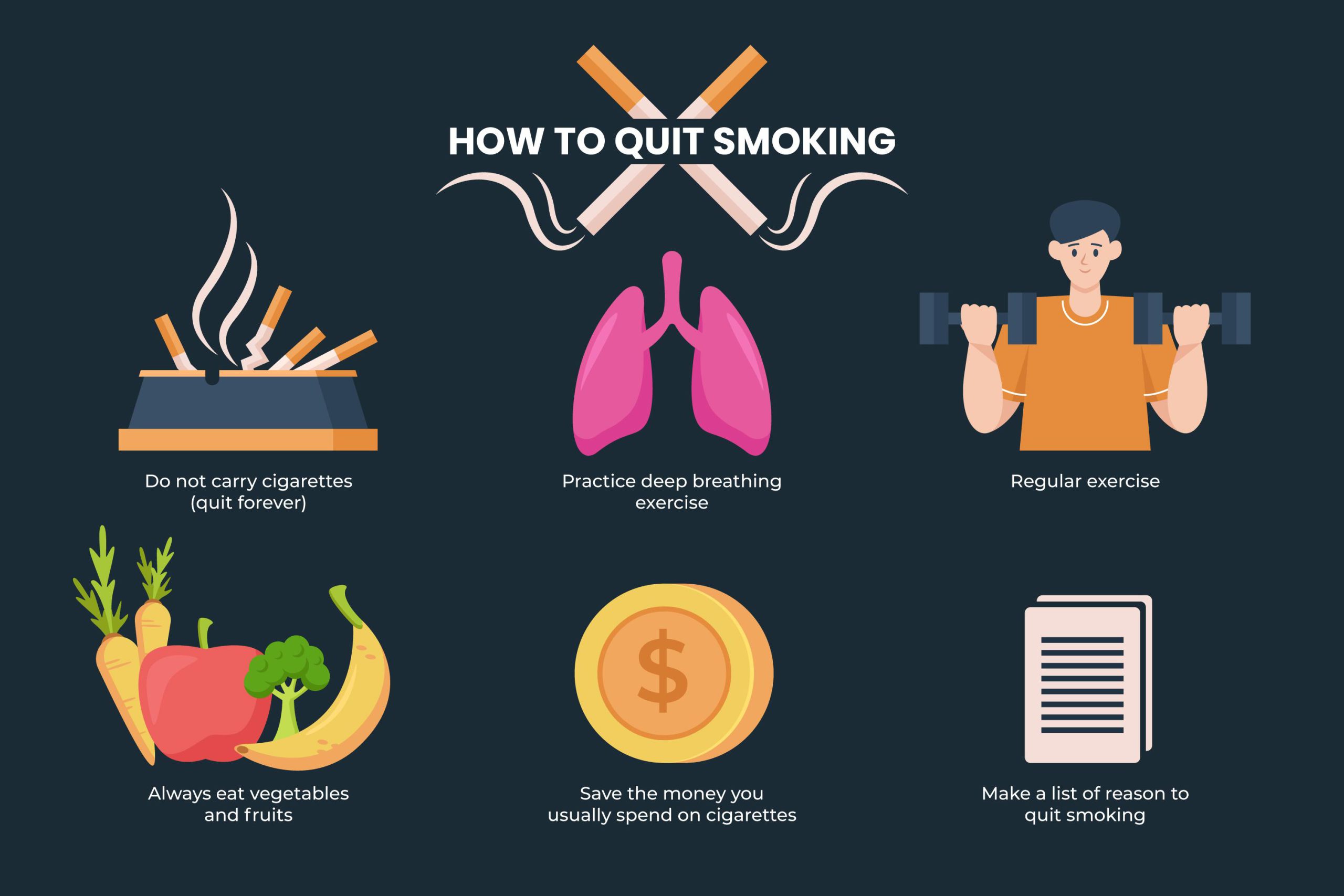“Smoking kills”
“Tobacco causes painful death”
“Smoking causes throat cancer”
“Cigarette smoking is injurious to health”
Cigarette packs come with a variety of warnings. But I often wonder if bold texts and gruesome photographs of cancer victims ever stop smokers from lighting one. If you smoke, many times many people must have asked you to quit smoking. You probably would have thought of kicking this habit too. The road to quitting smoking is not easy, but it’s worth it. Because cigarettes are not a “solution” to every “problem.” They are a huge problem themselves.
Blood Test To Know The Impact of Cigarette On Your Body. Get 20% Off On Your Booking.
What’s in a cigarette?
Just one drag of a cigarette and over 7000 chemicals are on their way to destroy your life. Among these, 250 are toxic and 69 carcinogenic. Let’s take a look at some of the deadly chemicals.
- Ammonia – a common household cleaner
- Acetone – used in nail polish remover
- Acetic acid – used in hair dyes
- Arsenic – used in rat poison
- Benzene – used in gasoline
- Butane – used in lighter fluid
- Lead – used in batteries
- Carbon monoxide – a part of car exhaust fumes
- Naphthalene – used in mothballs
- Nicotine – used in insecticides
- Methanol – used in rocket fuel
- Polonium 210 – radioactive element used in nuclear weapons
- Tar – used for paving roads
The main culprit
Nicotine is a toxic chemical present in a tobacco plant. Once inside the body, within seconds nicotine reaches the brain through the bloodstream, stimulating the release of dopamine and adrenaline. These hormones generate the feelings of pleasure and contentment, which explains the “kick” you feel after a smoke. Nicotine also promotes the release of beta-endorphin, a pain-inhibiting hormone. Once these happy effects wear off, you feel a drop in the mood and crave more. Nicotine is addictive. It is the main reason why you keep going back to cigarettes.
A slow death
-
Respiratory system
As a smoker, breathing issues must be nothing new to you. Toxic chemicals in cigarettes first come in contact with your respiratory system, damaging everything from the nose and upper airway to the alveolar surface of the lungs. Over time, this puts you at an increased risk of pulmonary diseases, including emphysema (shortness of breath), lung cancer and chronic bronchitis (irritation of the bronchial tubes causing chronic cough). Waking up gasping for breath is a worse wake up call than an alarm clock on your dresser. If you don’t quit now, you might be headed for irreversible damage.
-
Heart and cardiovascular system
Cigarette chemicals can induce permanent damage to the heart and blood vessels. Toxic chemicals cause the cells in your blood vessels to swell and speed up plaque formation. This plaque is made of fatty deposits, cholesterol, cellular waste, calcium, etc. The build up narrows down your blood vessels, making them thick and stiff. This cuts down the blood flow and oxygen transport throughout the body and gives way to numerous heart problems. Common heart conditions include blood clotting, high blood pressure, stroke, heart attack and heart failure.

-
Impact on the brain
With the first puff, your mood and concentration improve and you feel happy and stress-free. But in the long run, chemicals kill your brain cells and stop new ones from forming. The effect destroys your cerebral cortex, which is important for memory, thinking, learning, reasoning, emotions and functioning of your senses. There is no subtle way to put this, but the more you smoke, the dumber you get. You are also at thrice the risk of having a stroke, facial paralysis and cerebral aneurysm.
Pancreatic damage and diabetes
Most people associate smoking with lung and heart problems, but it also damages your digestive system, including the pancreas. Cigarette chemicals disturb the production and release of insulin and glucagon—two hormones required for maintaining blood glucose levels. Cigarette chemicals alter the way your body uses glucose and how cells respond to insulin. Going further, smoking puts you at high risk of diabetes and its complications, such as obesity, kidney/liver/heart damage and much more.
-
Reproductive health
Since nicotine restricts blood flow throughout the body, it is obvious your genitals do not get enough blood supply to stay healthy. Smoking decreases the production of sex hormone as well as sexual desire. For men, this causes erectile dysfunction and decreases sexual performance. For women, it causes sexual dissatisfaction and inability to reach orgasm.
-
Eye problems
If you are still not able to see how harmful cigarettes are, you probably have eye problems. Cigarette chemicals reduce the fresh blood supply to your retina. Keep smoking, and you will suffer macular degeneration, cataract, dry eyes, glaucoma and diabetic retinopathy. There is a high chance smoking will leave you completely blind.
-
Gum diseases
Not just a stinky breath, but smoking gives you double the risk of gum diseases. You are likely to experience swollen and tender gums, bleeding while brushing, loose sensitive teeth and tooth aches. The teeth get yellow, and you can see brown deposits on them. The more you smoke, the higher the risk of dental problems, teeth discoloration, lip darkening and black hairy tongue. You are definitely going to need more than just a mouth freshener.
-
Spinal cord issues
We all must be aware of elderly relatives suffering from spondylosis. It is a common age-related wear and tear of the spinal discs. Smoking speeds up the degenerative process. The spinal discs between your vertebrae lose cerebrospinal fluid at a faster pace. This fluid is important to protect and support your spinal cord. Any injury to the back and you will be left with life-long back pain, slipped discs and possibly osteoarthritis (a degenerative disease of the joints). Do you have the spine to quit?
-
Integumentary system (skin, hair and nails)
We all want to look our best while going out. Our looks or hairstyle can either make or break our entire day. But imagine having skin issues, hair loss and stinky fingers all the time? If you are a smoker, these problems are inevitable. Research shows that cigarette smoking increases your risk of skin cancer. The skin ages faster and is more prone to wrinkles, dark spots and premature ageing. Hair problems, like hair fall, balding, hair thinning and greying, are common phenomena. Your nails are not safe either. They become yellow and stinky and can easily develop fungal infections.
-
Cigarettes & cancers
The relation between cigarettes and lung cancer is well known, but that’s not all. Cigarettes cause several other types of cancers. These include cancers of skin, blood, mouth, throat, larynx, kidney, cervix, liver, colon, pancreas, bladder, testicles, ovaries…literally everything.

If you still need a little extra motivation, consider adding the following, seemingly smaller but equally important, reasons to your list.
Think of the money you will save
Answer the following questions and be honest with yourself.
How much does one cigarette cost? How many cigarettes do you smoke daily? How much does it cost you monthly? How much have you spent on cigarettes since your first smoke? How much have you spent on healthcare due to smoking-related conditions?
All the money you burned in a smoke so far could have been in your bank account right now. Health is indeed your wealth.
You deserve a better social life
Not just your health, smoking affects your relationships too. You might have lied to your loved ones just to be able to go out and get a smoke. You might have withdrawn yourself from the non-smoking group of friends. You might have held yourself back from social events. Smoking is less acceptable in society now than before. Research shows that smokers agree that their social connections reduce and they become less social and more lonely.
Your fittest self
If you are a smoker, try running for 15 mins straight. Bet you can’t even get through the first 5 mins without running out of breath. After you quit, simple tasks become easier, such as climbing a flight of stairs. You can go back to playing your favourite sports or activities you once enjoyed. Even if you are an athlete in a great physical shape or work out a lot, smoking will over time cost you a lot in terms of health and stamina. There is no such thing as “I compensate for my smoking by exercising.”
For your loved ones
Smoking also impacts the health of people around you. Exposure to secondhand smoke carries the same risk to a nonsmoker as a smoker.
Is there a safe level of smoking?
“One cigarette a day is not harmful.”
“Passive smoking won’t kill you.”
“Cutting back is just as good.”
“Mild cigarettes are less risky.”
“I only smoke occasionally.”
No matter the excuses, there is no safe level of smoking. Smoking 1-5 cigarettes per day is as harmful as smoking 20+ cigarettes per day. For heavy smokers, the risk of lung cancer mortality is 23 times in men and 13 times in women than non-smokers.
Quit for good
Cigarettes come at a great cost: your life. Irrespective of how long you’ve been smoking for, it’s never too late to quit. As soon as you stop, your body starts healing itself:
- In 20 minutes, heart rate and blood pressure drop.
- In 12 hours, carbon monoxide levels in the blood drop to normal.
- In 24 hours, nicotine levels drop to zero.
- In 1-3 months, blood circulation and lung functions improve.
- In 1 year, coughing and shortness of breath decrease.
- In 3-6 years, the risk of coronary heart disease drops by half.
- In 5-10 years, the risk of mouth, throat and larynx cancer is halved and the risk of stroke reduces.
- In 10 years, the risk of lung cancer is half that of smokers.
- In 15 years, the risk of coronary heart disease reduces and becomes close to that of a non-smoker.
Tobacco urges and cigarette cravings can be strong, but if you are determined, you can stand up against these.

Testing at Thyrocare
Smoking Impact Checkup profile by Thyrocare helps assess health conditions and warns you of any serious illnesses due to smoking. The profile covers 66 tests, including screening for thyroid functions and organs like the kidneys and liver. The profile helps in the early detection of diseases related to tobacco consumption. Some of the important parameters covered in the profile are as follows:
- Nicotine metabolite: The liver breaks down nicotine into a number of different metabolites, e.g. cotinine, a widely used biomarker for daily nicotine intake. The parameter evaluates metabolite levels in the body.
- Cardiac risk markers & lipid profile: Smokers are at high risk of heart diseases due to high cholesterol levels.
- HbA1c and fasting blood sugar: Smokers are more susceptible to diabetes due to high blood sugar.
- Vitamin B12: Smoking reduces vitamin B12 levels in the body.
- Carcino Embryonic Antigen: Cancer marker test; high CEA levels can be a sign of certain types of cancers.
Don’t wait, quit today!

